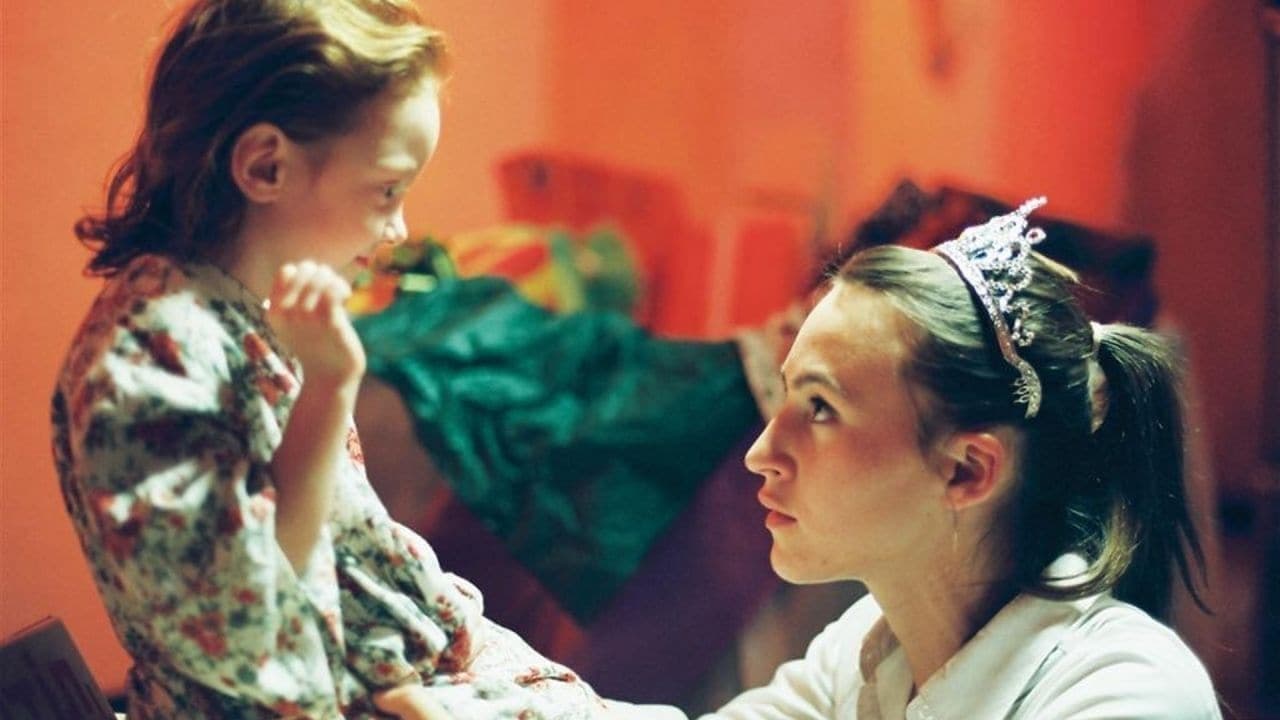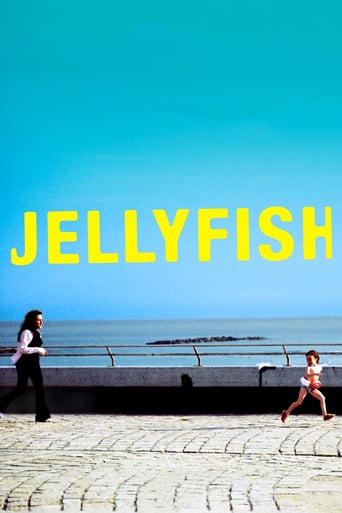

Very well executed
... View MoreSave your money for something good and enjoyable
... View MoreEasily the biggest piece of Right wing non sense propaganda I ever saw.
... View MoreThe movie really just wants to entertain people.
... View MoreJellyfish, for all its generous spirit and life-affirming moments, doesn't shy away from the little absurdities that inundates everyday existence. Even in the same frame there is a glow amid the isolation and personal embitterment. An unbearable lightness that cannot help but expose the chalky hands of fate. Those who have ever asked in exhaustion, "why me?" can find a lot to love about this little Israeli import.The film is told through a hyperlink narrative. Though its themes are much more ethereal than those of Traffic (2000) or New Year's Eve (2011). That and the narratives don't so much interlock as they migrate towards and away from each other. We follow the progression of three struggling women adrift in noisy Tel Aviv, vexing over life's ennui. While doing so, the women cross paths, barely glimpsing each other's existential angst.The first women is the young Batya (Adler). She's a sullen, ineffectual banquet hall waitress, struggling to keep her job and an apartment that's slowly falling apart. Meanwhile her divorced, working professional parents all but ignore the warning signs of her mounting depression, brought about when her boyfriend leaves her. Unexpectedly, while trying to relax at the beach, a mute child (Leidman), freckled and wet, appears like a vision. She tries to find out to whom the child belongs to, to no avail.The second woman of our story is newlywed Keren (Knoller) whose Caribbean honeymoon has been botched by a faulty bathroom stall. Her ankle now broken, she tries to make the best of a worsening situation, by following her husband Michael (Sandler) to an aging sea side hotel in town. It is there that Michael meets an attractive writer (Albeck) whose femme fatale allure threatens the strength of their new marriage.The third woman is a Filipino caretaker named Joy (De LaTorre). Joy tries and repeatedly fails to connect with her employer (Harifai) whose tersely shouts in Hebrew and German, neither of which Joy speaks. She pines to have her son with her, vainly communicating with him through short collect calls and promises of gifts and visits.A common motif that permeates all three stories is that of water. Joy is mesmerized by a toy boat she wants to get her son, while Keren complains that they're a short walk from the beach yet can't see the sea. She also begins to write a poem, wistfully equating her feelings of isolation to that of a ship in a glass. Finally there's Batya whose discovery of the child on the beach, unlocks dormant traumas that include her parents arguing as the young Batya drifts out to sea in an inflatable tube. Could the water represent transition and the possibility of renewal? Perhaps yes, perhaps not.The magical realism that seeps into the lacquered grooves of this film brings with it occasionally irksome subjectivity that's nearly impossible to decode. This film doesn't hold your hand but rather lets you explore the serendipity of Jellyfish's world through the eyes of three women who are dulled by constant misfortune. Some may find their woes pedestrian and cloying, especially considering the film is Israeli and completely ignores political realities. Yet choosing characters that exhibit the incessant, hard to describe hum of anxiety and depression gives the film both a timelessness and a universality. In the end, there's solace in the arms of others; a lesson that those quietly suffering would be wise to heed.While occasionally stodgy, Jellyfish doesn't wear out its welcome, finding just enough pulp in the stories while reveling in some art- house expressions and compositions. The subjectivity of its framework works in its favor to deliver a film that can be read in many ways, including being a frank and effective meditation on depression. It does all this without being showy or overly pretentious but instead lingering on the deflation of character expectations, before rewarding its audience with small but meaningful victories.
... View MoreThe movie has a multi-layered plot rich with symbolism. The elfin from the sea, who refuses to take off her float ring, is a jellyfish, which somehow symbolizes unfulfilled childhood wishes. The corporate strong woman, or politician, whose appearances on TV and posters punctuate the movie, laments nowadays parents fail to give their children anything. The main character Batya, while she was a child, had a deep craving for ice-cream while on the beach but the ice-cream man was turned away by her mother. The jellyfish elfin shows Batya a photo album with only one picture in it, and it is the ice-cream man on the beach, with a breeze blowing his shirt (as it moves on the photo). When the mysterious poetess, who has given up her suite to the honeymooners, commits suicide, the groom Michael finds a dead jellyfish under his feet on the beach. The jellyfish imagery is aquatic, as the poetess refers to a ship in the bottle, sealed up and not feeling any wind and thus stagnant. The Filipino domestic helper, Joy, wants to buy a large ship model for her son back home. When for the second time she gazes at the toy boat in the shop's display window, a magical effect appears: the little sails are fed by the wind, as if a real-life ship is on high sea—a little stirring of real life, like the ice-cream man's shirt catching a breeze in the photo? A third time in front of the shop, she finds it sold and becomes very much dejected, only to find it in her employer Malka's living room, meant as a gift to her. So, Joy is the only one that succeeds in giving her child something. The parent-child disappointment is not a one-way traffic, as Malka's daughter who hires the Filipino helper Joy to take care of her aging mother tries to win some acclaim to her performance in Hamlet, and all she gets from her mother is: "You lied on the floor half of the time, and uttering words that are not understandable even to people on stage!" At the end of the movie, the actress lady stares from the street resentfully through the window as her mother Malka embraces Joy inside the house.
... View MoreI just saw this movie on Sundance Channel. Maybe my opinion is unique, but I think this movie is about how we all experience and deal with abandonment in life. Batia, abandoned by her parents from childhood, has in effect even abandoned herself. She sees herself in the mystery child, alone and unable to communicate. When the child disappears, did the child abandon her or did she abandon the child by yelling? As she grapples with the dilemma, she faces her own childhood disappointment which she describes to a friend in the memory of an ice cream man on the beach. In the poignant scene Batia says, "They promised he'd come back." The friend reassures, "Don't worry, he's always around." I think in the end, her friend and the child help Batia to heal and finally feel secure about drifting through the great sea of life.In the second story, will the bride and groom abandon one another when marriage, like their tiny hotel room, is uncomfortable and feels confining, or will they learn to expand in their appreciation for one another and grow even closer? I disagree with the GOOFS section because of what must have been said in the unseen part of the story where Keren explains on why they must go downstairs. I think he knew full well when the handwriting changed because at that point he handed over the paper as he acknowledges there is more to his new wife than he realized. Together they gaze at the sea contemplating.Lastly, Joy watches as parents are abandoned by children and children abandon their parents. All she can think of is crossing the ocean to get back to her little boy.I loved this movie! Maybe I healed a little bit in watching it.
... View MoreMeduzot (2007) is an Israeli film written and co-directed by Shira Geffen. (The other co- director is Etgar Keret.) The film was shown in the U.S. with the title "Jellyfish."Sarah Adler plays Batia, a fine person, but possibly the world's worst waitress. One day, at the seashore, a young girl drifts to shore, buoyed by a small plastic doughnut-shaped tube, and walks up to Batia. This little girl, played by Nikol Leidman, never speaks. We know she exists, because at one point she and Batia are in a police station, and the detective sees her too. However, that's all we know about her. Ms. Leidman is either completely guileless, or she's the best actor in the film. Her solemn, wide-eyed gaze is riveting.Several other characters interact in the film--a Filipino nurse who has been forced to emigrate without her young son, a brother and sister and their sick mother, and a newly wedded bride who has broken her leg on her wedding day.I enjoyed the movie because it was about ordinary people living ordinary lives--no soldiers, no explosions, no violent confrontations. The acting was uniformly excellent, and I was caught up in the film from beginning to end. It's worth seeing and worth seeking out. It will probably work well on DVD--most of the action is intimate and doesn't require a large screen. This film was shown at the excellent Rochester High Falls International Film Festival.
... View More